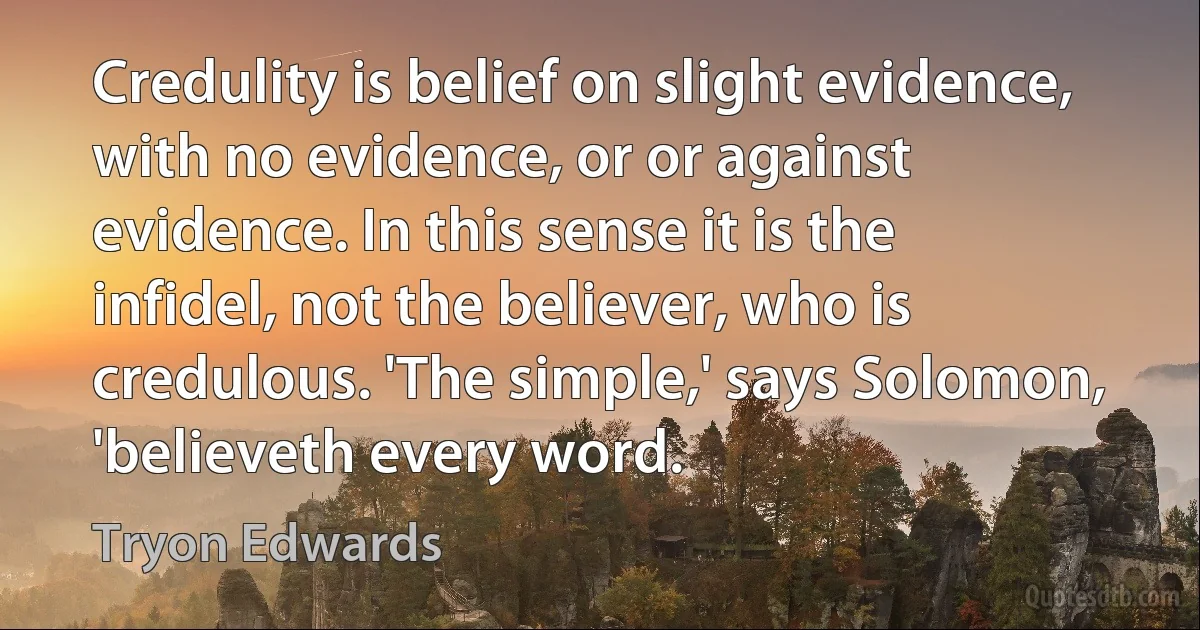Believer Quotes - page 20
Enlightenment can't be pursued or sought after. [...] Truth is here now; no past, no future. People are unenlightened only because they believe in the truth of the past and therefore must look to the rewards of the future. To be enlightened, to return to the original state of life on earth, requires action now in the present with no reference to the past. What has to be done is to kill the old priest in you, starve out the traditionalist, the follower, the believer.

Barry Long
A life-worshipper's philosophy is comprehensive. He is at one moment a positivist and at another a mystic now haunted by the thought of death and now a Dionysian child of nature now a pessimist and now, with a change of lover or liver or even the weather, an exuberant believer that God's in his heaven and all's right with the world.

Aldous Huxley
... Newton was an unquestioning believer in an all-wise creator of the universe, and in his own inability like the boy on the seashore to fathom the entire ocean in all its depths. He therefore believed that there were not only many things in heaven beyond his philosophy, but plenty on earth as well, and he made it his business to understand for himself what the majority of intelligent men of his time accepted without dispute (to them it was as natural as common sense) the traditional account of the creation.

Isaac Newton
[T]he daimonic power does not merely take the individual over as its victim, but works through him psychologically, it clouds his judgment, makes it harder for him to see reality, but still leaves him with the responsibility for the act. This is the age old dilemma of my own personal responsibility even though I am ruled by fate. It is the ultimate statement that truth and reality are psychologized only to a limited extent. Aeschylus is not impersonal but transpersonal, a believer in fate and moral responsibility at the same time.

Rollo May
The Swiss-born psychiatrist Elisabeth Kubler-Ross changed western cultural resistance to dealing with death, and the teaching of how to accept it... Kubler-Ross's best known contribution to the study, thanatology, that she had helped to create, was the five stages of dying people go through. She described them - denial, anger, bargaining, depression and acceptance - in her bestseller On Death And Dying (1969), written in two months. Not everyone experiences all five, she cautioned, but at least two are always present. The definition, reached after scores of interviews with people facing imminent death, helped the medical profession to deal with a factor it had long refused to acknowledge, especially in the US... She wrote more than 20 books.. A firm believer in a god and the life hereafter, she became fascinated with near-death experiences and an advocate for people's stories of seeing a shining light and familiar faces, before being brought back from the brink.

Elisabeth Kübler-Ross
We must not inadvertently slip into the same condition internally as the one which we fight externally. Like Abraham Lincoln, I am a firm believer in the people and, if given the truth, they can be depended on to meet any national crisis. The point is to bring before them the real facts.

Douglas MacArthur
I once met a pompous ass of a believer who had this religious-sense theory in an exaggerated degree. It is not at all my custom to obtrude the question of religion in conversation, but somebody maliciously tried to draw the man into debate about God with me. He would say nothing but, with comic solemnity: "I know there is a God." He would not explain further, but his meaning was clear. He felt it. He sensed it. And there is but one possible form in which he could have given precise expression to his actual experience. He was visibly annoyed, but still silent, when I put it. It is: "I have a strong conviction that God exists."

Joseph McCabe
Historical processes have never much interested me, but history is full of stories, full of triumph and tragedy and battles won and lost. It is the people who speak to me, the men and women who once lived and loved and dreamed and grieved, just as we do. Though some may have had crowns on their heads or blood on their hands, in the end they were not so different from you and me, and therein lies their fascination. I suppose I am still a believer in the now unfashionable "heroic" school, which says that history is shaped by individual men and women and the choices that they make, by deeds glorious and terrible.

George R. R. Martin
Conduct, practice, is the proof of doctrine, theory. "If any man will do His will - the will of Him that sent me," said Jesus, "he shall know of the doctrine, whether it be of God or whether I speak of myself" (John vii. 17); and there is a well known saying of Pascal: "Begin by taking holy water and you will end by becoming a believer." And pursuing a similar train of thought, Johann Jakob Moser, the pietist, was of the opinion that no atheist or naturalist had the right to regard the Christian religion as void of truth so long as he had not put it to the proof by keeping its precepts and commandments (Ritschl, Geschichte des Pietismus, book viii., 43).

Miguel de Unamuno
If it were up to me, I would not define myself by the absence of something; "theist" is a believer, so with "atheist" you're defining yourself by the absence of something. I think human beings work on yes, not on no. ... humanist is a great term. ...except that humanism sometimes is not seen as inclusive of spirituality. To me, spirituality is the opposite of religion. It's the belief that all living things share some value. So I would include the word spiritual just because it feels more inclusive to me. Native Americans do this when they offer thanks to Mother Earth and praise the interconnectedness of "the two-legged and the four, the feathered and the clawed,” and so on. It's lovely. ... because it's not about not believing. It's about rejecting a god who looks like the ruling class.

Gloria Steinem
His conflict with the Catholic Church arose because deep in his heart Galileo was a believer. There was for him no path of compromise, no way to have separate secular and theological cosmologies. If the Copernican system was true as he believed, what else could Galileo do but fight with every weapon he had in his arsenal... to make his Church accept a new system of the universe. ...In the contrast between Galileo's heroic stand when he tried to reform the cosmological basis of orthodox theology and his humbled, kneeling surrender when he disavowed his Copernicanism, we may sense the tremendous forces attendant on the birth of modern science.

Galileo Galilei
The believer in the inspiration of the Bible is compelled to say, that there was a time when slavery was right, when women could sell their babes, when polygamy was the highest form of virtue, when wars of extermination were waged with the sword of mercy, when religious toleration was a crime, and when death was the just penalty for having expressed an honest thought. He is compelled to insist that Jehovah is as bad now as he was then; that he is as good now as he was then. Once, all the crimes that I have mentioned were commanded by God; now they are prohibited. Once, God was in favor of them all; now the Devil is their defender. In other words, the Devil entertains the same opinion to-day that God held four thousand years ago. The Devil is as good now as Jehovah was then, and God was as bad then as the Devil is now.

Robert G. Ingersoll
From the things he did on the field, I figured he was 6'4” and more than 200 pounds. I was really surprised. He looked so small compared to the way I pictured him. I had heard all about his great arm and I began to think that he didn't have a good arm. You know how Roberto is in spring training – he doesn't throw hard until maybe a week or two before the season opens. He used to just flip the ball and I used to say to myself, ‘What kind of arm is that?' Then one day Roberto made one of his throws... you know the kind. Boom – it goes from right field to home plate like a bullet. I became a believer after one throw.

Roberto Clemente



